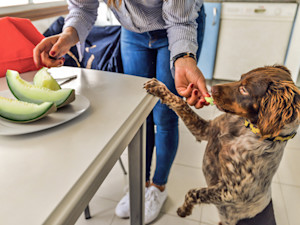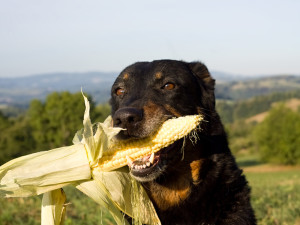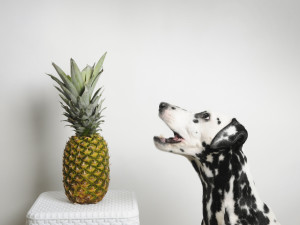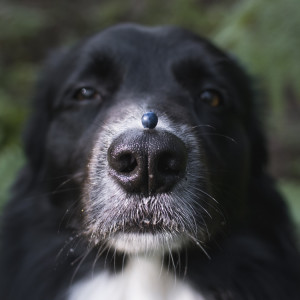The Best Fruits for Dogs to Eat
Doggie-safe fruit salad, anyone?
In This Article:
Safe Fruits for Dogs The Best Fruits for Dogs Can Dogs Eat Dried Fruit? Can Dogs Eat Canned Fruit? Fruits Dogs Should Avoid What to Do If Your Dog Eats Toxic Fruit
Many fruits are safe and healthy for dogs in moderation, providing them with essential nutrients and a tasty treat. However, it’s important to note that not all fruits are safe for dogs, and some can be toxic. Always remove pits, seeds, and any inedible parts before offering fruits to your dog.
Best fruits for dogs to eat
Fruit can be nutritious, hydrating, and delicious, so why not share it with your pup when you can? There are many fruits that can be healthy and safe for dogs to eat as long as you follow some basic guidelines. It‘s important to keep in mind that dogs need to eat a complete and balanced diet that meets all of their nutritional needs, so all treats and table foods should be kept to a minimum to ensure they get their basic nutritional needs met.
Also, while fruits can provide many health benefits, they tend to be high in sugar. Consuming lots of sugar can put dogs at risk for weight gain and other medical problems, such as diabetes. For this reason, fruit should be offered in small amounts, and ideally, try to stick to fruits that are lower in sugar. Read on to learn more about the best fruits to share with your pup.
How much do you spend on your pet per year?
What fruits are safe for dogs?
Before offering any fruits to your dog, be sure that they are safe and non-toxic for dogs.
Next, be sure that the fruit you offer is as fresh as possible and that it is thoroughly washed to remove any residues of pesticide or dirt. Never let your dog eat fruit that is rotten or moldy. Finally, be sure to start with just a small bite-sized taste to ensure your dog does not have any adverse reactions to the new food.
With all fruit, it’s important to remove the skin, seeds, pits, or stems before offering to your dog as many of these parts are difficult to chew or digest and can cause problems for your pup if they are swallowed whole. Some of the fruits that are safe for dogs to eat include:
Apricot
Blackberries
Cantaloupe melon
Cherry
Fig
Honeydew melon
Kiwi
Nectarine
Peach
Pear
Plum
Raspberries
What are the best fruits for dogs?
,The best fruits for dogs to eat are going to be the ones that provide the biggest boost of nutrients combined with a lower sugar content. This includes:
Apples: Apples are unique in their combination of both soluble and insoluble fiber. This means they help to provide bulk to the stool which prevents constipation while also supplying important nutrients to the microbiomeopens in new tab. In addition to being chock full of healthy fiber, they also contain potent antioxidants, like quercetin, which can help reduce inflammation and prevent certain types of cell damage. Most of the fiber and antioxidants are in the skin of the appl,e so this is one fruit that you might want to offer with the skin on as long as it doesn’t cause digestive upset for your pup. Just be sure to remove the stem, core, and seeds as these are not safe for dogs to eat.
Blueberries, raspberries and strawberries: Believe the hype. These tiny superfoods pack valuable nutrients including fiber, minerals like potassium and magnesium, and vitamins. They also contain anthocyanins, powerful antioxidant compounds that have a protective effect on the heart, brain, and against certain kinds of cancer.
Cantaloupe and honeydew melons: These melons contain less sugar than melons like watermelon while still providing healthy amounts of fiber, minerals like potassium, and vitamins A, B6, and B9. They also contain a lot of water which can help your pup stay hydrated on a hot day.
Kiwi: While this may not be every dog’s preferred fruit due to its tart flavor, if your dog does like kiwi, it is a very healthy choice. Kiwis contain lots of fiber, minerals like calcium, magnesium, and phosphorus, and vitamins E, and B9, along with plenty of antioxidants. Interestingly, they are also being studiedopens in new tab for their possible benefits on digestive health as they have long been used in traditional medicine to aid in digestion.
Can dogs eat dried fruit?
Dogs can eat some dried fruit in small amounts. Dried fruits tend to be higher in sugar and fiber than fresh fruit, so keep this in mind when sharing with your pup. Too much fiber can cause digestive upset so you don’t want to overdo it. And we know that too much sugar isn’t good for our dogs, either.
Dried fruits may also contain added preservatives like sulfur dioxide, which is safe for most dogs, but some may be sensitive to it. It is always a good idea to start by offering just a very small amount to watch for any signs of a reaction. Also, try to find brands that do not contain added sugar. Stay away from any dried fruit products that contain raisins as these are toxic to dogs.
Can dogs eat canned fruit?
Canned fruit can be ok in small amounts so long as the fruits are safe for dogs. Avoid any mixes that contain toxic fruits like grapes. Also, be mindful of the sugar content as many canned fruit mixes contain added sugar or are in syrup which will make them too sweet for our pups.
What fruits can dogs not eat?
There are some fruits that should be avoided altogether. These include:
Avocado: Avocados contain a compound called persin that is technically toxic to dogs. A dog would have to eat a lot to get very sick, though, even in smaller amounts, it can cause digestive upset like vomiting or diarrhea.
Citrus: Technically, citrus fruits like oranges are not toxic for dogs but the oils in the peel and plant can cause both skin irritation and digestive upset. And in fact, many dogs are turned off by the smell of citrus anyway. Use caution when sharing citrus with your pup and be sure to remove all the skin first.
Grapes and raisins: Grapes and raisins contain a compound called tartaric acid which is toxic to dogs and can cause kidney failure even in small amounts. These should never be shared with your dog. Even if a small amount is ingested, you should contact your vet and a pet-poison hotline right away to discuss treatment.
Guava: Technically guava is not toxic to dogs but the seeds and pulp are very difficult to digest. This can lead to digestive upset and in extreme cases, it can cause an intestinal blockage if enough is consumed.
Tamarind: Tamarind is related to grapes in that it also contains tartaric acid, making it toxic for dogs. Dogs should not consume any products containing tamarind.
Pits, seeds and plants from cherries, peaches, apricots, plums, and pears: All parts of these plants except the fruit contain cyanide. This includes the leaves of the trees, the seeds or the pits. Dogs would need to consume a large amount to get sick, but this compound can cause serious illness if enough is ingested. Be sure to only offer the flesh of the fruit without any pits or stems attached. Larger pits like those in apricots, plums, and peaches can also cause intestinal blockages if they are swallowed whole.
What if my dog eats a toxic fruit?
If you are ever concerned that your pup consumed a toxic fruit or anything toxic for that matter, contact a pet poison hotline and your veterinarian right away. They can give you the best guidance on what to do next based on exactly what your dog ate, how much they ate, and how much they weigh. For certain mild toxins, you may be able to take a conservative approach and just monitor at home for any adverse effects. For others, like grapes, it is usually necessary to seek treatment right away to avoid serious complications.
FAQs (People also ask):
Can my dog eat yogurt with fruit?
This is not a good choice for dogs since these usually contain a lot of sugar and many dogs do not tolerate dairy well. Be sure that the fruit in these yogurts are safe and non-toxic for dogs if you are going to share a lick.
Is citrus good for dogs?
Citrus fruit is OK for dogs in small amounts so long as you remove all the skin and keep them away from the plant, which contains toxins.
Can dogs eat fruit snacks?
Dogs should not eat fruit snacks; these are high in sugar and lack the nutrients that whole, fresh fruits provide. In most cases, they are not toxic as long as they do not contain grapes or other specifically toxic ingredients.
References:
ASPCA Poison Control: Healthy Safe Snacks to Help your Pet Slim Downopens in new tab
Cleveland Clinic: 5 Health Benefits of Anthocyaninsopens in new tabHarvard School of Public Health: Nutrition Source: Applesopens in new tab
Mayo Clinic Health System: Melons Pack a Nutritional Punchopens in new tab
The Nutritional and Health Attributes of Kiwifruit: A reviewopens in new tab


















